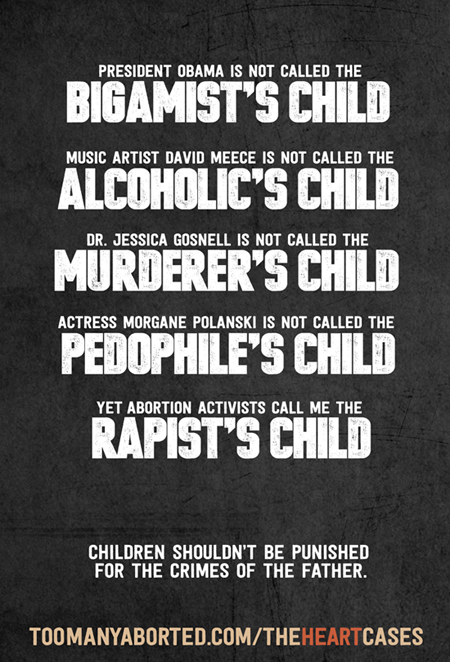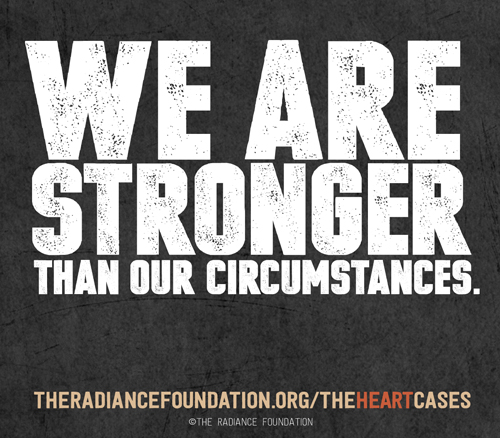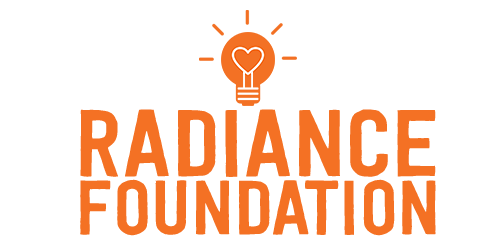Wow! I hate that phrase. “Rapist’s child”, “rapist’s baby”, “rape baby”, or “product of rape”—all equally despicable, yet intentional, pejoratives used by abortion activists to debase those conceived in such horrid violence. As if these revilers had any control over the circumstances of their own conception, they stand as judge and executioner of human beings with the exact same cellular makeup.
Do we refer to children as the “drug dealer’s child” or the “adulterer’s child?” President Obama’s alcoholic father was married multiple times. In fact, his  father was married to two different women concurrently. Do we call Obama the “bigamist’s child” or the “alcoholic’s child”? That would be horrible. Granted, people hold various views of our Commander-in-Chief, but who would call him the Abandoned-in-Chief because of his deadbeat dad (no matter the wishful dreams he had of his father)?
father was married to two different women concurrently. Do we call Obama the “bigamist’s child” or the “alcoholic’s child”? That would be horrible. Granted, people hold various views of our Commander-in-Chief, but who would call him the Abandoned-in-Chief because of his deadbeat dad (no matter the wishful dreams he had of his father)?
When do we ever define an innocent child by the crimes of either parent? This is only necessary to those whose ideology demands the dehumanization of that life to justify killing via abortion. It assuages those who demand that certain human life have zero civil rights.
This year is the 50th anniversary of the Civil Rights Act of 1964, celebrated as one of America’s most pivotal moments. Most don’t realize that it is nearly a mirror copy of the Republican-only passed Civil Rights Act of 1875, championed by famed abolitionist (and my hero) Frederick Douglass. The act was later ruled, in 1883, unconstitutional by the Supreme Court. (They have often been Supremely wrong!) February is Douglass’ birth-month as well as President Abraham Lincoln’s. Both men changed the trajectory of our nation’s civil rights. Lincoln’s conscience was reshaped by Douglass, a man whose name is synonymous with abolition (despite Steven Spielberg’s grotesque omission of him in his award-winning eponymous film). Lincoln’s heart was moved by the eloquence and conviction of a man who wasn’t even considered human. The leader of the Party created to abolish slavery was compelled to rethink his views of humanity and equality by a former slave who abortion activists, today, would call a “rapist’s child.”
Frederick Douglass, racially mixed, was born as a result of the rape of his biological mother, a slave, by her slave master. But Douglass is defined by his greatness, his achievements, by something other than the crime that caused his conception. He wasn’t the “slave master’s child” but a resilient human being who fought to ensure the dignity of all human life. He was a man who rose from the seemingly impossible to be an incomparable orator, author, newspaper publisher, women’s rights advocate, ambassador, abolitionist, and…Presidential advisor.
We all have that capacity within us. We’re all created equal, which means the beautiful possibility that is within that child who was “planned” is no different than that which was instilled in me despite my violent conception. My biological mother was strength personified. She chose to be stronger than her circumstances. I am beyond grateful for her courage and the incredible gift of life and love she gave to me, especially through adoption. And as I’ve discovered by talking to rape survivors across the country at events on college campuses, in churches, in schools, and in adoption-related conferences, there is a common thread. Children conceived in rape are often considered by their biological mothers as the only redemption amidst the horrific devastation of rape.
 According to a published study* in the Journal of American Obstetrics and Gynecology an estimated 50% of women who conceive after being raped choose abortion, but that’s not the end of the story. Surprisingly to some, 32.2% choose to continue their pregnancy and parent the child with 5.9% opting to make an adoption plan, according to the same study. Nearly 40% choose life! I continue to meet these women, both post-abortive (who often express their regret) and those who gave birth to their child. To add a little more context, abortions due to rape constitute 1% of all abortions nationwide. But these are stories worth knowing, perspectives demanding more than a soundbite or the exploitation by a “pro-choice” politician trying to scare the public into embracing abortion.
According to a published study* in the Journal of American Obstetrics and Gynecology an estimated 50% of women who conceive after being raped choose abortion, but that’s not the end of the story. Surprisingly to some, 32.2% choose to continue their pregnancy and parent the child with 5.9% opting to make an adoption plan, according to the same study. Nearly 40% choose life! I continue to meet these women, both post-abortive (who often express their regret) and those who gave birth to their child. To add a little more context, abortions due to rape constitute 1% of all abortions nationwide. But these are stories worth knowing, perspectives demanding more than a soundbite or the exploitation by a “pro-choice” politician trying to scare the public into embracing abortion.
Many call these situations the hard cases. I call them the heart cases, because it takes more than numbers to sway people to reconsider what society offers as “healing” to women so horrifically violated. It takes sharing the other side of the story, showing people the tangible reality of that 1% and the beautiful Possibility that every life possesses. The violence of abortion, on both the child and the mother, does nothing to punish the rapist. According to many post-abortive rape survivors I’ve talked to, it doesn’t erase the emotional or physical trauma either.
I am not the “rapist’s child”. I was her child. I am God’s child. I’m one of thousands, every year, given the opportunity to live, love and redeem what the rapist tried to destroy. Our stories are full of hope, full of love, full of purpose. And, when given the chance to share our experiences, we change people’s hearts and minds about the heart cases proving that triumph can rise from tragedy.
*Just because something is published in a peer-reviewed journal doesn’t mean it isn’t seriously biased. The researchers in the Rape-related Pregnancy study may have quantitative accuracy, but their qualitative assessment is absurd. This research is also cited on the website of ACOG, The American College of Obstetricians and Gynecologists, dated 2011. Authors of the study claim that “rape-related pregnancy occurs with significant frequency”, while indicating that an estimated 5% of rape victims conceive. Then, they further exploit the tragedy of rape by declaring that rape-related pregnancies are “a cause of many unwanted pregnancies”. The 1996 study—the only one of its kind–estimated that there were 32,101 of these pregnancies each year, of which 11.8% were miscarried, leaving 28,313 viable pregnancies. There were 6,240,000 pregnancies that year in the US, of which 16% were miscarried, leaving 5,241,600 viable pregnancies. According to the CDC, 49% were deemed “unintended”. So out of 2,568,384 “unintended” pregnancies, 28,313 rape-related pregnancies make up 1.1% of those. How in the world does that constitute “a cause of many unwanted pregnancies”? The study further indicates that 50% of pregnancies resulting in rape, or 14,156 viable pregnancies, were aborted. In 1996, when this research was published, there were 1,365,700 legal abortions according to Guttmacher Institute. Children conceived in rape, then aborted, amounted to 1% of all abortions. Yet these tragic cases are used to justify 100% of abortions.

